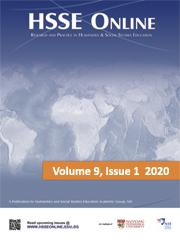HSSE Online Editorial
The articles in this volume make a strong case for a re-invigorated Humanities and Social Studies education at all levels of schooling; an education that as Wang notes in the first article, helps educators “grow to become comfortable with the uncomfortable,” whether it be with controversial issues and difficult discussions, challenging inquiry methods or the move away from comfortable classroom routines to more inclusive, experimental and progressive pedagogies. All of the articles in this volume make a strong case for putting students firmly in charge of their learning, whether it be through constructive conflict talk, issues investigation, environmental action, empowering students to construct what it means to be a citizen, giving students greater voice and choice in their lessons, or using talk moves to enhance student participation and agency in Geography classes. Putting students at the center promises a shift away from teacher-dominated lessons and didactic instruction toward what makes learning worthwhile, engaging, relevant and meaningful for learners.
This move toward more experiential, active and challenging pedagogy involves addressing authentic social problems that connect to students’ experiences, teaching through meaningful classroom discussions and engaging students in complex thinking processes. Such learning supports the building of an inquiry culture, inquiry mindsets and the social practices that can support lifelong inquiry and learning. Each of the articles in this volume provide insights, examples and practical approaches that can move classroom practice more firmly in these directions.
The first article by Melvin Wang provides an approach to teaching controversial issues in primary schools by encouraging students to consider different points of view through the skillful use of open-ended questions and constructive conflict talk. This approach draws upon and respects students’ emotions, imagination and inventiveness to address conflicts they are likely to experience in their lives and as citizens. In doing so, students will be better prepared to understand and address conflict that is part of living in society with diverse others who will have different perspectives, values and emotional concerns, an important aspect of creating informed, concerned and participative citizens.
In the second article, Peidong Yang reports on a study that examined the challenges teachers face in teaching “Issues Investigation” as part of the issues- and inquiry-based Upper Secondary Social Studies syllabus released in Singapore in 2016, as well as how they “tamed” or managed these challenges in their instruction. The paper highlights how teachers and students must continually negotiate curriculum and instruction, given particular constraints and competing priorities encountered in educational settings.
The third article addresses the gap between students’ “knowing” and “doing” in Environmental Education in Singapore. The author, Yee Jie Ying, creates a framework to analyze components of Environmental Knowledge in the Lower Secondary Geography curriculum to show how the emphasis on knowledge may impede environmental action among students and the author calls for greater consideration of what sorts of knowledge might more effectively promote environmental stewardship among youth.
The fourth paper by Ysabel Ortiz is a moving autobiographical account of how powerful pedagogy and the influence of a teacher can inspire one to be a caring citizen with a keen sense of agency and commitment to one’s society and nation. The powerful idea of teaching the nation as a work in progress, an ongoing project continually formed and reformed by its citizens, invited the author to develop her own sense of agency as a citizen, empowered to contribute to the nation in her own way (as an educator). The transformative potential for both the individual and society is a testament to the ways an instructor can engage students in transformative pedagogies that deepen their sense of agency.
Lin Yunqing highlights the role of “talk moves” to engage students in the geographic literacies and thinking skills necessary to work with geographical data. In the fifth article of the issue, she draws on social constructivism to demonstrate how geographic knowledge construction is supported by talk moves that require students to voice and clarify their reasoning, listen closely to each other and engage with other students’ reasoning. The article outlines specific moves that can aid both teachers and students in classroom discussion to develop geographic understanding and skills.
The sixth article by Siti Dzhawieyah offers a teachers’ reflections on an action research project that gave her primary students greater voice and choice during monthly lessons on current affairs known as News Sharing. In her reflections, she highlights many of the tensions she experienced as a teacher in moving toward more student-centered discussions about complex issues.
Finally, Mark Baildon shares a commentary on inquiry-based learning (IBL) research in Singapore. In this article, he shares what Singapore-based research tells us about IBL and pedagogical practices in classrooms that have effectively supported IBL. This article was reprinted with special permission by NIE Perspectives. To access the site, click: https://nie.edu.sg/perspectives and log in with your NIE gmail which is in this format: john.smith@g.nie.edu.sg (log in with your NIE password). Alternatively, you can go to the NIE portal > Staff Services > NIE G Suite and click Perspectives. Following the commentary, is a curated list of related research by NIE faculty.
The articles in this issue of HSSE Online highlight the essence of a powerful humanities and social studies education in which students are taught to see themselves as both active learners and participatory social actors who can make a difference in their societies. On behalf of the authors of this issue, I invite you to dig into these articles, share them with your students and colleagues and continue to move the field of humanities and social studies education forward, toward new directions that are more meaningful, authentic and enriching for students and society.
Mark Baildon
Editor, HSSE Online

